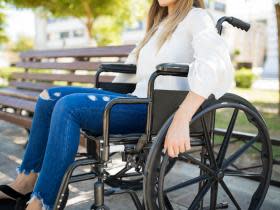Sex and scoliosis: A conversation on disability and intimacy is long overdue

Despite one in five people in the UK identifying as disabled (having a longstanding illness, disability or impairment that causes significant challenges to activities of daily life) – it is virtually impossible to access information on how to navigate disability, sex and relationships. Inspired by Brooke’s theme for sexual health awareness week – Sex and Disability – I decided to chat to others living with scoliosis (a curvature of the spine).
I was 14 when I underwent spinal surgery for scoliosis (a curvature of the spine) – I had metal Harrington rods inserted in my body, my right rib removed for bone grafting and had to have a back brace for a year. Aside from chronic back pain and a slight leg length discrepancy (I wear a foot raise in all my right shoes) my condition is entirely hidden. It meant significant changes to my mobility, acquiring new scars and altered the way I navigate relationships, yet it was something I was ill-prepared for. So, with so many people living with disability, why is this not something that we discuss more?
For many young people, living with disability also means missing a substantial amount of time from school during their operations and procedures. Amina* a stay-at-home mum aged 39, underwent multiple spinal surgeries including the insertion of Harrington rods between the ages of 10 and 14 for scoliosis: “I didn’t get any sex education [...] I missed it all because I was in hospital”. Amina felt that her lack of confidence about her body including unequal breast size and hips (due to scoliosis) led her to seek “validation” from sex. But would our current sex education have helped Amina? Likely not, given that up to 80 per cent of those teaching sex education struggle to find relatable images for their students.
Many of those that I spoke to felt that they had figured it out eventually, but had also been lucky enough to find partners that were flexible and understood their needs. Yet, Amina, who stands at 4ft 10, admitted that some sexual positions could be more challenging, causing her pain, but she did not always feel confident enough to ask her partner to change positions.
Amy* aged 24, who is living with multiple conditions including neurofibromatosis type one, scoliosis, Ehlers-Danlos Syndrome admitted sometimes it can cause a strain on her relationship: “I could be okay doing one thing but when I am in pain, I push him away and he gets annoyed”. These experiences suggest we must be doing much more to educate everyone about communication during sex, educating those with disability to advocate for their needs as well as recognising that those living with disability can be more vulnerable in their relationships.
Read more
Two thirds of women with physical disability unable to have smear test
But it is not just about successful sex education, it is also about understanding how disability entirely reshapes the experiences of some young people. For Amina, that meant having a different experience of her first period: “I don’t even remember starting my period because according to my mum, it happened after my operation in the hospital”.
I, too, had my first period shortly before my surgery. I was in too much pain to be mortified but it would have been nice if someone had prepared me – I woke up with a catheter and a pad on – it was a strange experience.
Then there are the reproductive health issues from childbirth to menopause which we fail to acknowledge may differ considerably for those living with disability. Scoliosis often means the pelvis can be a different shape, which can make vaginal births more difficult. This was the case for Dr Josephine Perry, a psychologist, aged 43 who declined scoliosis surgery at 13 so she could continue to dance: “The angle of my curve meant everything inside was wonky too, so I had to have a planned caesarean section.” Amina underwent four caesareans complicated by inadequate spinal anesthetic; there was very little pre-conception counselling or contraceptive advice (as planned pregnancies may be safer for some people) provided to her after her births.
http://players.brightcove.net/624246174001/default_default/index.html?videoId=5837728067001
Support free-thinking journalism and attend Independent events
It is time that we as a society start to rethink how living with disability impacts the whole of sexual health and well-being – with so many people affected, it can no longer be an after-thought. In particular, we need to develop better resources that cater to a range of individuals particularly, young people with learning disabilities. We must support innovations such as home ordering of sexual health screening and contraception and sex-tech which may improve the sexual lives of those living with disability.
*Name has been changed to protect anonymity
You can download Brook’s free resources (from 16 September) and find out more about Sexual Health Week 2019 here
Read more
Read more Two thirds of women with physical disability unable to have smear test

 Yahoo News
Yahoo News 
